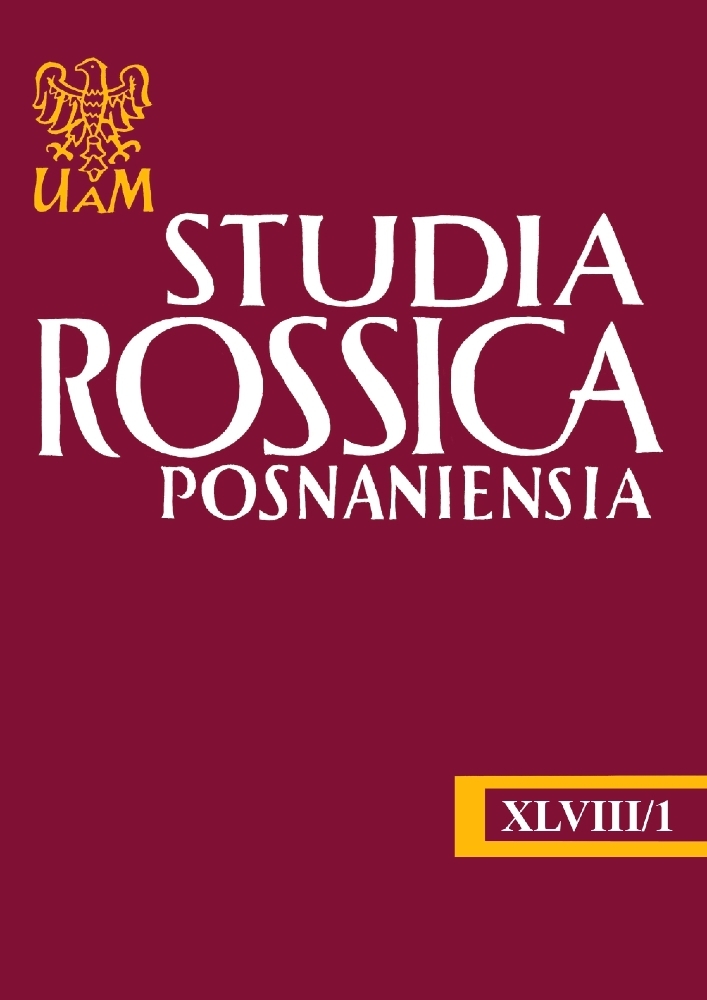Abstract
The aim of this paper it to discuss the techniques employed in modern political Russian verbatim drama, as well as in their performances. Modern verbatim drama seeks to stay relevant and up-to-date by referring to taboos, radical social controversies, and political incidents. So, it becomes an important event of not only cultural but also social life, and it exerts a strong impact on
modern Russian society. The aesthetics of the modern verbatim drama is aimed at representing the reality which is absent from official discourse. Such texts as One hour eighteen minutes by Elena Gremina, Three quarters of sadness (Bolotnaya square case) by Polina Borodina, The last party by Anna Dobrovolskaya, and New Antigone by Elena Kostyuchenko openly explore the issues which
do not function as part of the public discourse. Thus, they capture the traumatic experiences in order to overcome traumas. These texts take the traumatic events of current political and public life out of the marginal area, and they acquire the status of social statements which give hope for political and social changes, and give rise to unofficial discourse allowing the readers as well as the viewers to define their own opinion related to the traumatizing events.
References
Abramkin, Valerij. Iz predanij o doktore Gaaze. Web. 28.08.2021. https://arzamas.academy/mag/985-prison.
Aleksander, Džeffri. „Kulʹturnaâ travma i kollektivnaâ identičnostʹ”. Per. Grigorij Olʹhovikov. Socio-logičeskij žurnal, 3, 2012, s. 5–40.
Alisova, Ol’ga. „Bolotnoe delo” političeskij spektaklʹ o Lûbvi. Web. 15.08.2021. https://www.bbc.com/russian/russia/2015/05/150507_bolotnoe_case_theatre_play.
Anzikeev, Vladimir. „Poslednââ večerinka rossijskih pravozaŝitnikov”. Deutsche Welle, 19.12.2016. Web. 30.08.2021. https://www.mhg.ru/poslednyaya-vecherinka-rossiyskih-pravozashchitnikov.
Âkubova, Natalʹâ. „Rossijskij Teatr.doc i vengerskij Kretakor: podval – èto važno”. Teatr, 34, 2018, s. 116–117.
Bibliâ onlajn. Web. 11.08.2021. https://bible.by/verse/23/58/7/.
Bolotân, Ilʹmira. „Verbatim”. Novyj filologičeskij vestnik, 2, 2011, s. 81–88.
Bolotân, Ilʹmira. „Dokumentalʹnaâ dramaturgiâ verbatim: avtorskoe prisutstvie pri otsutstvii pozicii”. Iskusstvo i kul’tura, 1 (9), 2013, s. 25–33.
Bolotân, Ilʹmira. „Dok i Dogma: teoriâ i praktika”. Teatr, 19, 2015, s. 130–137.
Bolotân, Ilʹmira. „Antislovarʹ Mihaila Ugarova”. Teatr, 34, 2018, s. 122–131.
Borodina, Polina. Tri četverti grusti. Web. 13.08.2021. https://www.polinaborodina.com/bolotnoedelo.
Borowski, Mateusz. W poszukiwaniu realności. Kraków, Księgarnia Akademicka, 2006.
Dobrovolʹskaâ, Anna. Pravozaŝitniki. Web. 28.08.2021. https://bookmate.com/.
Gremina, Elena. „«Dokumentalʹnyj teatr – èto ne političeskij kontekst, èto instrument dlâ issledovaniâ»”. Nastoâŝee vremâ, 1.04.2017. Web. 21.08.2021. https://www.currenttime.tv/a/28393413.html.
Gremina, Elena. „Issledovanie ada v golove sovremennogo čeloveka”. Novaâ gazeta, 27, 16.03.2018. https://novayagazeta.ru/articles/2018/03/16/75819-issledovanie-ada-v-golove-sovremennogo-cheloveka.
Gremina, Elena. Čas-18. 2010. Web. 10.08.2021. https://bookmate.com/books/uhRcehIs.
Kamenskaâ, Anastasiâ. „Bolotnoe delo”: premʹera spektaklâ v Teatre.doc. Web. 15.08.2021. https://www.buro247.ru/culture/arts/bolotnoe-delo-premera-spektaklya-v-teatre-doc.html.
Kamû, Alʹber. „Mif o Sizife. Èsse ob absurd”. Sumerki bogov. Web. 04.08.2021. http://filosof.historic.ru/books/item/f00/s00/z0000807/index.shtml.
Kempf, Lucie. „Giving Testimony in the Face of an Authoritarian Regime: The Evolution of Documentary Forms at Teatr.doc, the KnAM Theatre and the Belarus Free Theatre”. New Drama in Russian. Performance, Politics and Protest in Russia, Ukraine and Belarus. Red. Julie Curtis. London, Bloomsbury Academic, 2020. DOI: https://doi.org/10.5040/9781350142497.ch-002
Koni, Anatolij. Fedor Petrovič Gaaz. Biografičeskij očerk. Sankt-Peterburg, Izd. A.F. Marksa, 1904. Web. 29.08.2021. http://dugward.ru/library/koni/koni_f_p_gaaz.html.
Kostûčenko, Elena. Novaâ Antigona. Web. 18.08.2021. https://snob.ru/entry/156697/.
Losev, Aleksej. „Dialektika mifa”. Mif – čislo – suŝnostʹ. Moskva, Mysl’, 1994.
Okudžava, Bulat. U Gaaza net otkaza. Web. 29.08.2021. https://thelib.ru/books/okudzhava_bulat_shalvovich/u_gaaza_net_otkaza-read.html.
„Rossiâ: Nečestnaâ igra: presledovanie pravozaŝitnikov v Rossii usilivaetsâ”. Amnesty International, 17.09.2019. Web. 30.08.2021. https://www.amnesty.org/en/documents/eur46/0950/2019/ru/.
Rudnev, Pavel. V poiskah pravdy. 19.02.2013. Web. 11.08.2021. https://teatral-online.ru/news/8765/.
Šimadina, Marina. Tri četverti grusti. Web. 15.08.2021. http://oteatre.info/tri-chetverti-grusti/.
Ušakin Sergej, Elena Trubina, red. Travma: punkty. Sbornik statej. Moskva, Novoe literaturnoe obozrenie, 2009.
Vaškau, Nina. „«Svâtoj doktor» Fedor Petrovič Gaaz”. Science Journal of VolSU. History. Area Studies. International Relations, 17 (2), 2012, s. 26–31.
Žurčeva, Olʹga. „Verbatim kak mehanizm sozdaniâ «novoj dokumentalʹnosti» v novejšej russkoj drame”. Filologiâ i kulʹtura, 3 (45), 2016, s. 84–90.
License
Copyright (c) 2023 Elena Kurant

This work is licensed under a Creative Commons Attribution-NonCommercial-ShareAlike 4.0 International License.

